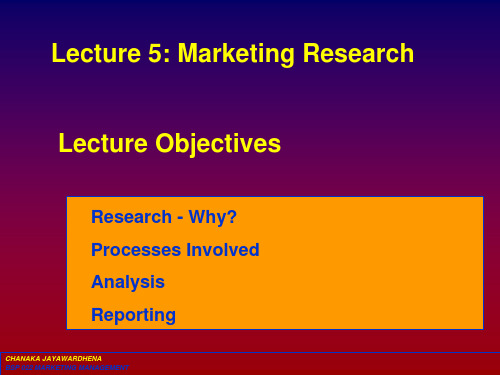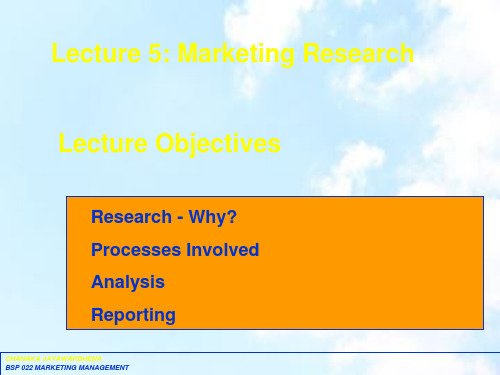英国大学市场营销讲义(一)
英国大学市场营销讲义Short Brand Sponsorship

Housekeeping New Developments Reprise of Session VIII
– Advertising
y’s Topic
– Leveraging Secondary Associations to Build the Brand
Nike in ‘98 World Cup)
Sponsorship Status
Sincerity and Local Sponsorship (Community based e.g Tesco’s computers for Schools). High Status and Perceived Quality of Sponsoring Brand(s) Global Events and Quality
• Sponsorship/Celebrity Endorsement
New Developments
Monopoly – revitalising an Old Brand
– Disney Version – Nottingham Version
Metropolitan Police
–Patent, Trademark the helmet and badge
–Already done by the NYPD
Yao Ming Birthdate: 9/12/80 NBA Position: Center Team: Shanghai Sharks Education: Shanghai Sports College Ht: 7-5 Wt: 295 Hometown: Shanghai, China
英国大学市场营销讲义1

7
Creating Customer Value
Positive
Customer value
Negative
Perceived benefits
Product benefits Service benefits Relational benefits Image benefits
Perceived sacrifice
Monetary costs Time costs Energy costs Psychological
costs
8
Creating Customer Satisfaction
Delight
‘Delighters’
Customer satisfaction
Neutral
‘More is better’
2
Production Orientation
Production capabilities
Manufacture product
Aggressive sales effort
Customers
3
Marketing Orientation
Customer needs
Potential market opportunities
英国大学市场营销讲义1
2020年7月19日星期日
What is marketing?
To attract and retain customers at a profit (Drucker, 1999)
To establish, develop and commercialise long-term customer relationships so that the objectives of the parties involved are met (Gronroos, 1989)
“市场营销”讲义(英文PPT 273页)

Economic Environment
Income Distribution
Subsistence economies Raw-material-exporting economies
Industrializing economies Industrial economies
Savings, Debt, & Credit Availability
Objectives
Course Organization Tasks of Marketing Major Concepts & Tools of Marketing Marketplace Orientations Marketing’s Responses to New
Challenges
Macroenvironmental Forces
World trade enablers Asian economic power Rise of trade blocs International monetary crises Use of barter & countertrade Move towards market economies “Global” lifestyles
Simple Marketing System
Communication
Industry (a collection
of sellers)
Goods/services Money
Market (a collection
of Buyers)
Information
Company Orientations Towards the Marketplace
英国大学市场营销讲义英文版:Lect5_presentation

Initial contact (1)
Research brief (2)
Research proposal (2/3)
Exploratory research
Main data collection stage (3/4)
Data analysis and interpretation (4)
Descriptive or experimental
The second stage
Objective - a firm decision is taken to go ahead with research. Commence detailed background studies and prepare data collection methods/instruments.
CHANAKA JAYAWARDHENA BSP 022 MARKETING MANAGEMENT
A marketing information system
Marketing environment
The company Customers Competitors Suppliers Distributors Economic Social Legal Technological Physical forces
Research proposal • What will be done • How much will it cost • How long will it take
Exploratory research • Literature review • Secondary sources • Publicly available data
research
英国市场营销专业介绍

英国市场营销专业介绍一、专业介绍市场营销是在创造、沟通、传播和交换产品中,为顾客、客户、合作伙伴以及整个社会带来价值的一系列活动、过程和体系。
美国市场营销协会给出过专门的定义:市场营销是创造,传播,交付和交换那些对顾客,客户,合作伙伴和社会都有价值的市场供应物的活动、制度和过程。
当一方考虑通过各种方式促使另一方做出预期的反应(如购买)时,就产生了营销管理。
可以把营销管理看成艺术和科学的结合——选择目标市场,并通过创造,交付和传播优质的顾客价值来获得顾客,挽留顾客和提升顾客的科学与艺术。
●分类:英国的市场营销项目分为以下三大类:管理型:品牌管理,市场竞争战略,销售队伍管理,销售促进与公共关系等;实践型:销售、广告、促销、渠道等;技术型:市场研究,营销计划与组织,产品组合决策,价格决策等。
●课程:必修课一般涵盖Data,Models,and Decisions 、Economic Analysis for Business Decisions 、Organizational Processes、Communication for Managers 、International Business Management、Marketing Research等●申请概览大多数项目对申请者的本科背景没有严格的要求,只有如帝国理工、卡迪夫等少数几所学校明确要求学生有商科背景;,成绩在GPA82+、IELTS6.5+大多数项目都可以申请,部分项目申请建议有GMAT成绩,最好在700左右;专排、综排均比较好的学校有Lancaster University、University of Warwick、University of Leeds、University of Manchester、University of Exeter、Newcastle University等。
二、项目举例University of Warwick —MSc Marketing and Strategy学费:录取条件:IELTS7,不超过2项分数为6、6.5;建议GMAT 700核心课程:Manchester university —MSc Marketing 学费:录取条件:GPA82+,IELTS 7核心课程三、就业方向很多企业的市场营销人员大部分都是从其他专业或行业发展过来的,很多高级市场营销管理人员也没有接受过系统的营销知识培训和学习,做市场完全靠的是他们的经验和对行业发展前景的感觉,市场运作的科学性、系统性不强。
英国留学专业介绍——市场营销专业

英国留学专业介绍——市场营销专业市场营销专业(Marketing)是商科中的重要专业方向,其旨在为学生提供理论和实践知识,帮助其掌握基本的市场营销原则和技能,最终能够管理和推广产品和服务并实现商业目标。
以下是英国留学市场营销专业的介绍:一、课程设置。
市场营销专业的课程设置以商业原则、消费者行为、市场调查和组织营销策略为主要内容。
学生们将学习全面的市场营销知识,包括品牌分析、数字营销、广告、促销和销售推广等。
课程内容以实务为重,在课堂上会加入案例分析、演示和模拟,使学生能够在实践中掌握市场营销策略。
二、学习要求。
市场营销专业所需要的学生特短为沟通能力强,有领导力和组织能力,具备判断力和创新力,擅长分析和解决问题。
此外,需要有较强的数字思维和统计知识,能够熟练运用现代营销技术。
三、就业前景。
市场营销专业是一个非常广泛的领域,就业前景非常好。
毕业生可以在各大企业和组织中担任市场营销助理、营销经理、产品经理等职位。
根据薪资调查,市场营销专业的平均年薪在英国约为33,000英镑。
四、推荐院校。
英国有许多出色的商业学院,提供市场营销专业课程。
以下是几所知名院校:1.伦敦政治经济学院伦敦商学院(LSE)。
2. 帝国理工学院商学院(Imperial College Business School)。
3. 温彻斯特大学商学院(Winchester Business School)。
4. 纽卡斯尔大学商学院(Newcastle University Business School)。
5. 萨里大学商学院(Surrey Business School)。
以上就是英国留学市场营销专业的介绍,希望对广大留学生有所帮助。
英国大学市场营销讲义Lect6Product & brand Management

Branding Basics
Brands through History
Brands v Products - Products are:Made in Factories largely copiable potentially short lived
Branding Basics Cont‟d.
STARS QUESTION MARKS £ IN + £ OUT - - -DOGS £ IN +
?
HIGH Market growth rate
£ IN
+++
£ OUT - - 0 CASH COWS £ IN +++ £ OUT ++
Low
£ OUT 0
High Low Relative market share
– – –
An example: The value of the Rowntree brands
Kit Kat Quality Street After Eight Book value Market value 3000 m. : Smarties SFr. 762 m. : SFr.Lion0Fra bibliotekTime
PLC Useful or Useless?
Useless
– Many external/uncontrollable factors influence life cycle – Not empirically supported – The ‘s’ shaped curve doesn’t appear much in practice – and then only class life cycle – Which life cycle?
英国大学市场营销培训教案(英文版)

Level of involvement
.... . Differentiation
and number of alternatives
Extent of problem solving
Time pressure
8
The consumer decision-making process and level of purchase involvement
Lecture 2: Buyer Behaviour in Consumer and Organisational Markets
Lecture Objectives
Buyer Behaviour Consumer Decision Making Process Characteristics of Organisational Buying
Need recognition/problem
awareness
Information search
Evaluation Of alternatives
Purchase
Post-purchase evaluation of alternatives
9
Choice Criteria Used When Evaluating Alternatives
Buying to specific requirements
Reciprocal buying
Derived demand
Negotiations
4
The Buying Centre Gatekeepers
Buyers
control the flow
choose suppliers
英国大学市场营销讲义(一)1

Customer orientation Customer orientation
Corporate activities are Corporate activities focused upon providing are focused upon customer satisfaction providing customer satisfaction
CHANAKA JAYAWARDHENA BSP 022 MARKETING MANAGEMENT
Marketing Orientation Sales Orientation
Long run profits through customer satisfaction Short term gains in profit via sales increases
BSP420: MARKETING MANAGEMENT
Chanaka Jayawardhena Room. BE 2.19 (01509 22) 8831 C.Jayawardhena@ Session structure
• • A lecture (up to an hour) Followed by a break (10-15 minutes)
Matches customer needs
Creates a competitive advantage
Effective marketing mix
Well balanced
Matches corporate resources
CHANAKA JAYAWARDHENA BSP 022 MARKETING MANAGEMENT 11
Dies Slowly
Does well Thrives
英国大学市场营销讲义一)

organisation.
For personal or household
To manufacture other products
use
For resale to others
ORGANISATIONAL PRODUCT
CHANAKA JAYAWARDHENA BSP 022 MARKETING MANAGEMENT
4
Orange
Marketers use colour to convey meaning in this
advertisement
CHANAKA JAYAWARDHENA
BSP 022 MARKETING MANAGEMENT
11
CHANAKA JAYAWARDHENA BSP 022 MARKETING MANAGEMENT
High Involvement
Major personality important
Information search Limited search
Extensive search
Evaluation of alternatives and the purchase
Post-purchase evaluation of the decision
Ford Ka
Marketers use colour to convey meaning in this advertisement
12
Consumer or Organisational Products
Why was the product Purchased ?
For use in the operation of a business or
英国大学市场营销讲义Lect5_research

• Research brief • Background information • Sources of information • Scale of the project • The timetable
CHANAKA JAYAWARDHENA BSP 022 MARKETING MANAGEMENT
The second stage
Objective - a firm decision is taken to go ahead with research. Commence detailed background studies and prepare data collection methods/instruments.
Research proposal • What will be done • How much will it cost • How long will it take
Exploratory research • Literature review • Secondary sources • Publicly available data
Choose methods (channel where applicable) Decisions on Quantitative methods • Face to face interviews • Mail surveys • Telephone interviews • Internet surveys (email and web based)
Marketing information systems
A system in which marketing information is formally gathered, stored, analysed and distributed to managers in accord with their informational needs on a regular planned basis.
市场营销讲义英文275页PPT

Objectives
Components of a marketing information system Criteria of good marketing research Decision support systems for marketing management Demand measurement and forecast
Opportunities
Corporate Headquarters Planning
Define the corporate mission Establish strategic business units (SBUs) Assign resources to SBUs Plan new business, downsize older businesses
A marketing information system (MIS) consists of people, equipment, and procedures to gather, sort, analyze, evaluate, and distribute needed, timely, and accurate information to marketing decision makers.
Simple Marketing System
Communication
Industry (a collection
of sellers)
Goods/services Money
Market (a collection
of Buyers)
Information
Company Orientations Towards the Marketplace
英国大学市场营销讲义

英国大学市场营销讲义Market Marketing Lecture – United KingdomIntroduction:Welcome to today's lecture on market marketing! In this session, we will explore the principles and strategies behind successful marketing initiatives in the United Kingdom. Our goal is to provide you with an in-depth understanding of the market dynamics, consumer behavior, and marketing techniques in the UK.I. Understanding the UK Market:A. Market Overview:1. Size and potential growth: The UK market is one of the largestin Europe, offering significant growth opportunities for businesses.2. Key sectors: Identify the key sectors in the UK market, such as retail, services, manufacturing, and technology.3. Competitive landscape: Analyze the competitive landscape in the UK market, including major players and market shares.B. Consumer Behavior:1. Demographics: Understand the demographics of the UK population, including age, income levels, and cultural diversity.2. Buying habits: Explore the purchasing behavior and preferences of UK consumers, considering factors like price sensitivity, brand loyalty, and online shopping trends.3. Social influences: Examine the impact of social media, influencers, and cultural factors on consumer choices.II. Developing a Successful Marketing Strategy:A. Market Segmentation:1. Identify target segments: Analyze customer characteristics and preferences to segment the market effectively.2. Tailoring marketing tactics: Develop customized marketing campaigns for each target segment based on their unique needs, values, and preferences.B. Branding and Positioning:1. Creating a brand identity: Understand the importance of a strong brand image and how to develop it.2. Positioning strategy: Determine the market positioning of your brand by differentiating it from competitors and highlighting its unique value proposition.C. Marketing Mix:1. Product: Develop products or services that meet the specific needs and preferences of the UK market.2. Price: Pricing strategies considering consumers' price sensitivity and market competition.3. Promotion: Identify effective promotion channels, both traditional and digital, to reach the target audience in the UK.4. Place: Determine the most suitable distribution channels to ensure product availability and convenience for customers.III. Digital Marketing in the UK:A. The Rise of Digital Marketing:1. Understand the shift towards digital channels in the UK market.2. Explore the benefits and challenges of digital marketing strategies.B. Online Advertising:1. Explore various online advertising platforms and their effectiveness in the UK, such as search engine advertising, social media advertising, and display advertising.2. Optimizing online marketing campaigns to reach the target audience and achieve the desired objectives.C. Social Media Marketing:1. Identify popular social media platforms in the UK market.2. Utilize social media for brand building, customer engagement, and sales generation.IV. Evaluating Marketing Performance:A. Key Performance Indicators (KPIs):1. Determine relevant KPIs to assess the effectiveness of marketing initiatives in the UK.2. Measure and monitor KPIs to identify areas for improvement and make data-driven marketing decisions.B. Market Research and Analytics:1. Conduct market research to gain insights into consumer preferences, market trends, and competitors.2. Utilize analytics tools to analyze marketing performance, customer behavior, and campaign effectiveness.Conclusion:Effective market marketing in the United Kingdom requires a thorough understanding of the market dynamics and consumer behavior. By employing proper segmentation, branding, and marketing strategies, businesses can develop successful initiatives in this competitive landscape. With the rise of digital marketing, itis crucial to master and leverage digital channels to reach and engage the target audience effectively. Continuous evaluation and adaptation based on performance metrics and market research will ensure long-term marketing success in the UK.V. Effective Market Research in the UK:A. Primary Research:1. Surveys and questionnaires: Conduct surveys and questionnaires to collect first-hand data from the target audience. This can provide valuable insights into their preferences, behavior, and opinions.2. Focus groups: Create focus groups consisting of representative consumers to gather qualitative data and explore their attitudes, motivations, and needs in more depth.3. Interviews: Conduct interviews with key stakeholders, industry experts, and influencers to gain expert insights and an understanding of market trends.B. Secondary Research:1. Utilize existing data sources: Use market research reports, government publications, industry-specific magazines, and online databases to gather secondary data on market trends, consumer behavior, and competitor analysis.2. Market analysis tools: Utilize market analysis tools and platforms such as Statista, Mintel, and Euromonitor to access market size, growth projections, and consumer behavior data.3. Competitor analysis: Research competitors' marketing strategies, product offerings, pricing structures, distribution channels, and market positioning to identify opportunities and threats.VI. Effective Digital Marketing Strategies in the UK:A. Search Engine Optimization (SEO):1. Optimize website content: Create high-quality, relevant content that aligns with the target audience's search queries and keywords. Improve website structure, meta tags, and headings to enhance search engine rankings.2. Local SEO: If targeting a specific geographic area, optimize for local search by including location-specific keywords and creating local business listings on search engines and directories.3. Mobile optimization: Ensure websites are mobile-friendly and responsive to capture the growing number of mobile users in the UK market.B. Social Media Advertising:1. Create engaging content: Develop visually appealing and engaging content that resonates with the target audience. Utilize images, videos, and infographics to capture attention and promote brand awareness.2. Targeted advertising: Utilize demographic, behavioral, and interest-based targeting options on social media platforms to reach the desired audience segments effectively.3. Influencer marketing: Collaborate with relevant influencers to amplify brand reach and credibility among their follower base. Identify influencers whose values align with your brand and target audience.C. Email Marketing:1. Build a subscriber list: Encourage website visitors, social media followers, and customers to subscribe to your email list. Offer incentives like exclusive discounts or valuable content in exchangefor email addresses.2. Personalization: Segment your email list based on customer preferences and behaviors to deliver targeted, personalized email campaigns. Tailor emails to address customer pain points and provide relevant solutions.3. Automation: Utilize marketing automation tools to send automated, triggered emails based on specific customer actions or events. This improves efficiency and enables timely, relevant communication.VII. Implementing Marketing Performance Evaluation:A. Track Key Performance Indicators (KPIs):1. Revenue and sales growth: Monitor revenue and sales growth to assess the overall effectiveness of marketing initiatives.2. Website traffic and conversion rates: Track website traffic, bounce rates, and conversion rates to evaluate the performance of digital marketing campaigns.3. Social media metrics: Analyze metrics like engagement rate, reach, and follower growth to assess the impact of social media marketing efforts.4. Customer acquisition cost (CAC) and customer lifetime value (CLV): Calculate CAC and CLV to determine the profitability and sustainability of marketing efforts.B. Utilize Analytics Tools:1. Google Analytics: Use Google Analytics to track website traffic sources, user behavior, and goal completions. Set up conversion tracking to measure the effectiveness of marketing campaigns.2. Social media analytics: Leverage social media platforms' built-inanalytics to gain insights into follower demographics, engagement levels, and post performance. Use these insights to optimize content and targeting strategies.C. Continuous Improvement:1. Test and iterate: Conduct A/B testing for website landing pages, ad copies, email subject lines, and other marketing elements to identify and implement optimizations.2. Customer feedback: Gather customer feedback through surveys, reviews, and social media interactions. Use this feedback to improve products, services, and customer experiences.Conclusion:In conclusion, successful market marketing in the United Kingdom necessitates a deep understanding of the market, consumer behavior, and effective marketing strategies. By conducting comprehensive market research, businesses can gain valuable insights into their target audience's preferences, needs, and purchase behavior. Implementing tailored marketing strategies that encompass market segmentation, branding, and the marketing mix will help businesses effectively reach and engage the UK market. With the rise of digital marketing, businesses must leverage online channels such as search engine optimization, social media advertising, and email marketing to increase brand visibility, engage with consumers, and drive sales. Continuous evaluation of marketing performance through KPI tracking and analytics tools is crucial for optimizing marketing campaigns and making data-driven decisions.By employing these strategies, businesses can create impactful marketing initiatives that resonate with the UK audience and drive sustained growth and success in the market.。
英国大学市场营销讲义Lect5research

CHANAKA JAYAWARDHENA BSP 022 MARKETING MANAGEMENT
What is done with research output?
CHANAKA JAYAWARDHENA BSP 022 MARKETING MANAGEMENT
Qualitative methods •Consultation with experts •Observation
Stage three
The objective is to design the data collection instrument • Plan • Design • Ordering of topics • Types of questions • Wording and instructions • Layout • Scaling • Probes and prompts • Piloting (testing)
Initial contact
• Research brief • Background information • Sources of information • Scale of the project • The timetable
CHANAKA JAYAWARDHENA BSP 022 MARKETING MANAGEMENT
Initial contact (1)
Research brief (2)
Research proposal (2/3)
Exploratory research
英国留学市场营销专业解读

英国留学市场营销专业解读/ueditor/201710/23/0b8497919ba6ea6f6329640014bfd8 12.jpg" title="mp54256446_1452665873003_2.jpeg" alt="mp54256446_1452665873003_2.jpeg" width="401" vspace="0" height="250" border="0"/>从这个定义我们可以看出,营销的核心就是传递价值的这个过程,这个过程的每一步每一个环节,我们都可以定义为营销。
Marketing的核心是关注需求和欲望,在传统行业中,了解了目标群体的需求和欲望后,企业从产品研发,价格制定,产品生产包装,渠道分配控制,终端销售,及销售之后的客户服务,每一个环节都是为了达到最终的产品和价值传递交换的目的,因此都可以定义为Marketing。
在互联网行业中,本质上整个过程比较类似,只是更关注于具体产品。
读到这里我们可以发现,很多广义上的错误认为,Marketing 是做一件事,其实,Marketing是做整个过程中的每个环节,销售,广告,关系都可以某种意义上来说,都是Marketing的一部分。
市场营销职业前景如何?从传统企业的角度,简单的说,Marketing就是教育消费者为什么要买你的产品,为什么你的产品比别人的好。
你要使用对的方法和传递对的信息,去教育和影响你的目标受众。
越来越多的企业现在将自己转向市场导向的企业,举个例子,快消企业(FMCG,快速消费品)目前都是市场导向的,市场部一般都会作为公司的核心部门。
销售部根据市场部的指令进行销售战略;供应链根据市场部的要求供给,财务根据市场部的计算来提供财务支持,所有的部门都是围绕着市场部进行工作。
市场部的重要性可见一斑。
- 1、下载文档前请自行甄别文档内容的完整性,平台不提供额外的编辑、内容补充、找答案等附加服务。
- 2、"仅部分预览"的文档,不可在线预览部分如存在完整性等问题,可反馈申请退款(可完整预览的文档不适用该条件!)。
- 3、如文档侵犯您的权益,请联系客服反馈,我们会尽快为您处理(人工客服工作时间:9:00-18:30)。
Purchase
Post-purchase
evaluation of
alternatives
CHANAKA JAYAWARDHENA
BSP 022 MARKETING MANAGEMENT
9
Choice Criteria Used When Evaluating Alternatives
CHANAKA JAYAWARDHENA BSP 022 MARKETING MANAGEMENT
Understanding customers
How do they buy?
Where do they buy?
Who is important?
Customers
What are their choice
CONSUMER PRODUCT
2
Some Examples of Organisational Buying
Paper cups by McDonald's Computer chips by Toshiba Concrete by Local Authorities Oil by Electricity Generators Fertiliser by Farmers Accountancy services by Ltd.. Companies TV’s by Comet or Dixons
criteria?
When do they buy?
CHANAKA JAYAWARDHENA
BSP 022 MARKETING MANAGEMENT
2
The Consumer Decision-Making Process
Need recognition/problem
awareness
Information search
TechnicalReliability Durability Performance Style/looks
Comfort Delivery Convenience
Taste
SocialStatus Social belonging Convention Fashion
Economic-
Price Value for money
Self-image Perceived risk Social factors
Hedonism
Level of involvement
Differentiation and number of
alternatives
Extent of problem solving
Time pressure
CHANAKA JAYAWARDHENA
Running costs Residual value Life style costs
PersonalSelf-image
Morals Emotions
CHANAKA JAYAWARDHENA
BSP 022 MARKETING MANAGEMENT
5
Determinants of the extent of problem solving
Few alternatives evaluated on few choice criteria
Limited evaluation media search
Many alternatives evaluated on many choice criteria
Extensive evaluation including media search
CHANAKA JAYAWARDHENA
BSP 022 MARKETING MANAGEMENT
10
CHANAKA JAYAWARDHENA BSP 022 MARKETING MANAGEMENT
Sony
The importance of emotion and the relationship between feelings and rationalisations is highlighted in this Sony ad.
High Involvement
Major personality important
Information search Limited search
Extensive search
Evaluation of alternatives and the purchase
Post-purchase evaluation of the decision
4
Orange
Marketers use colour to convey meaning in this
advertisement
CHANAKA JAYAWARDHENA
BSP 022 MARKETING MANAGEMENT
11
CHANAKA JAYAWARDHENA BSP 022 MARKETING MANAGEMENT
organisation.
For personal or household
To manufacture other products
use
For resale to others
ORGANISATIONAL PRODUCT
CHANAKA JAYAWARDHENA BSP 022 MARKETING MANAGEMENT
Ford Ka
Marketers use colour to convey meaning in this advertisement
12
Consumer or Organisational Products
Why was the product Purchased ?
For use in the operation of aETING MANAGEMENT
8
The consumer decision-making process and level of purchase involvement
Stage
Low Involvement
Need recognition problem awareness Minor
Lecture 2: Buyer Behaviour in Consumer and Organisational Markets
Lecture Objectives
Buyer Behaviour Consumer Decision Making Process Characteristics of Organisational Buying
